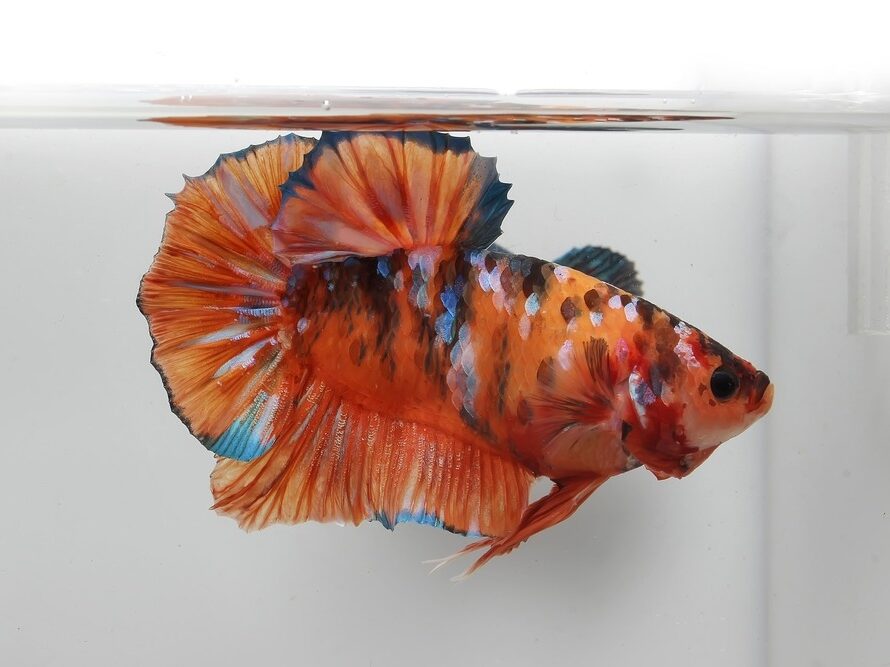King bettas are a striking fish to add to your aquarium. They’re similar to normal betta fish with one key difference—their massive size.
But unlike normal betta fish, king betta fish are incredibly hard to come by. They’re a rare type of Siamese fighting fish that you won’t find easily. That being said, they aren’t impossible to find and I’ll give you a few tips to help you get your hands on a big betta.
But before that, let’s learn how king bettas differ from other types of betta fish.
| King betta overview | |
| Size | Up to 4 inches |
| Lifespan | 2 to 3 years |
| Temperament | Aggressive and feisty |
| Scientific name | Betta Splendens Regen |
What is a king betta fish?
King bettas are fighting fish that grow up to 4 inches in length. King bettas are quite a bit bigger than regular halfmoon betta fish, which only grow 2-3 inches in length. Like all other betta fish, king bettas are aggressive and feisty. Male bettas tend to be more aggressive than females and do not tend to enjoy tank mates.
King betta vs regular betta fish
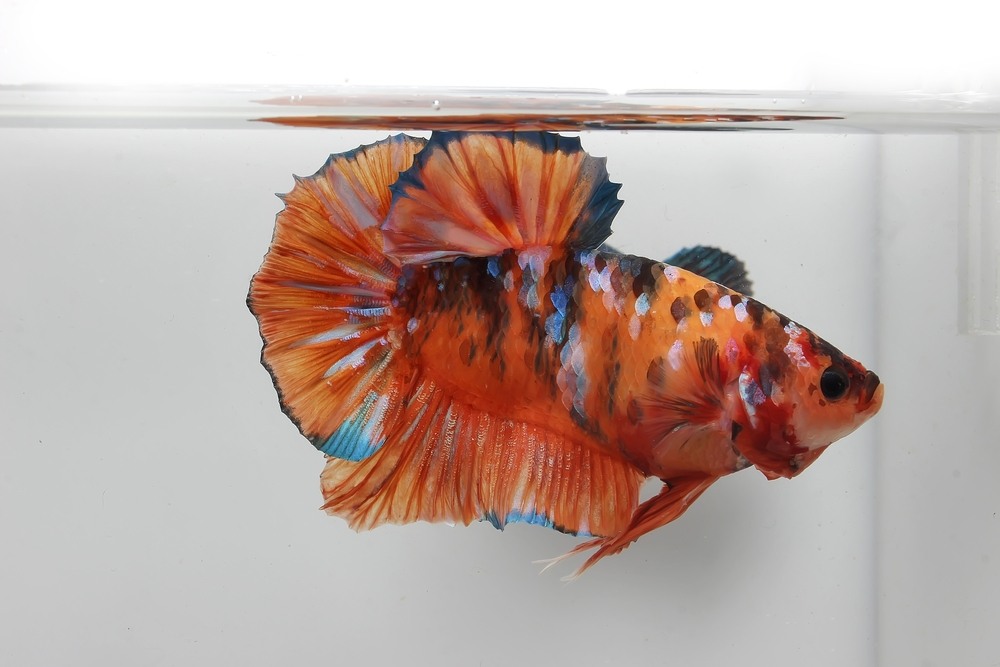
The fastest way to differentiate a king betta from a regular betta is by looking at its size. King bettas are usually 1-2 inches longer than other betta fish, and look plumper as well.
King bettas also have shorter fins compared to regular betta fish. Due to their big bodies, king bettas are often confused with giant bettas, but the giant betta fish is even bigger than the king betta, growing up to six inches in some cases!
King betta care and tank requirements
King bettas live two to three years, but with proper care, they may live slightly longer. Here’s what you need to know to provide the best care to your king betta.
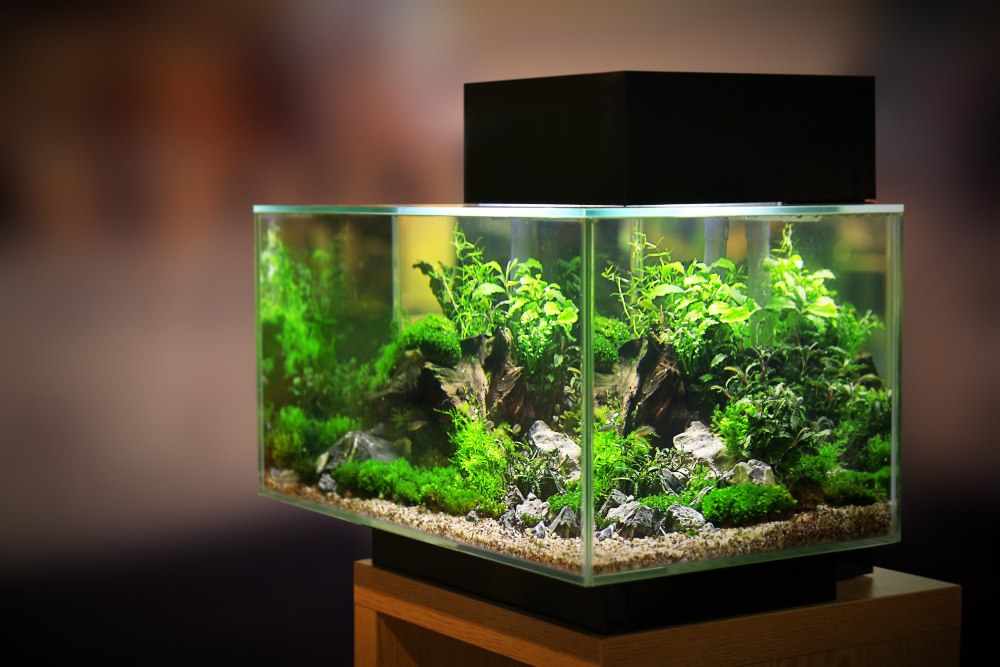
Tank size
Regular betta fish thrive in big tanks (a single betta fish needs at least a five-gallon tank). But due to their size, king bettas need an even larger tank.
The minimum size of a king betta should be at least 20 gallons. Anything smaller and your king betta may get sick, stressed, and depressed.
Water
Bettas are commonly found in ponds, rice paddies, and other slow-moving waters. They are used to living in warm tropical waters, and to keep them happy and healthy, fish keepers must imitate their original living conditions in the aquarium.
Temperature
First, make sure the water temperature of your king betta’s tank is between 75 to 80 degrees Fahrenheit. Water that’s too cold or too hot will make your betta sick and can potentially lead to diseases and death.
Parameters
Additionally, king bettas can’t live in hard waters, so the DGH (Degrees of General Hardness) should be between three to four. Moreover, the pH level should remain between 6.8 and 7.5 as bettas prefer a somewhat acidic/neutral environment.
Flow
As betta splendens live in slow water currents, you should avoid adding a strong water filter to your tank. A strong filter makes it challenging for bettas to swim. As well, their flowy tails and fins may get sucked up and damaged by strong filters, so it’s important to get a good filter for your betta fish tank.
Tank décor
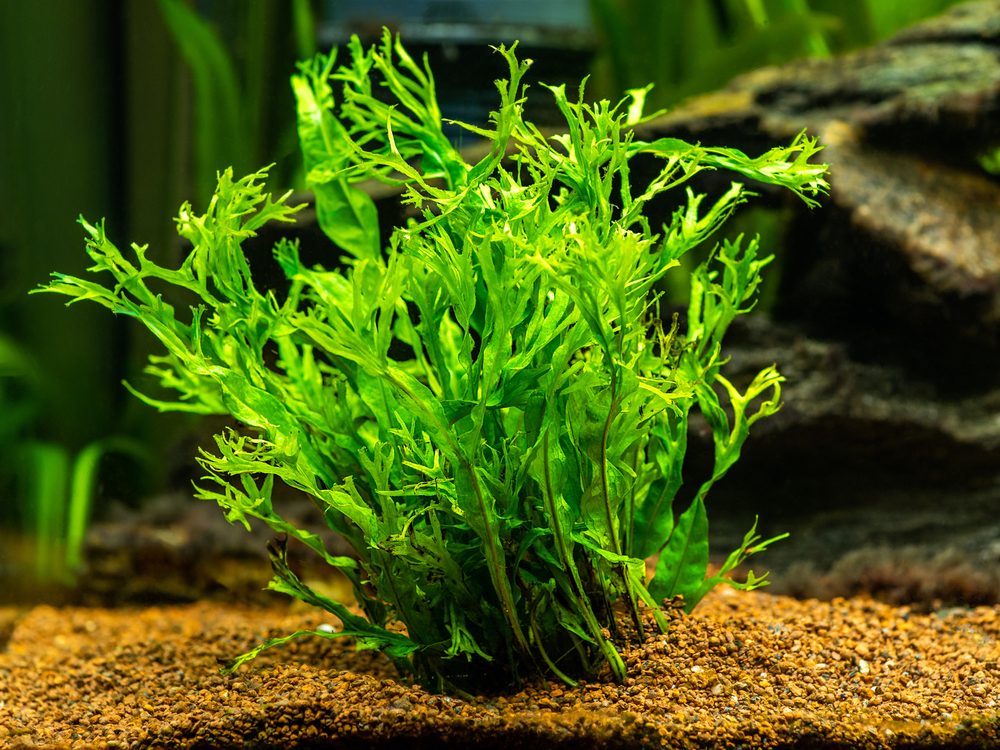
Java fern
Like regular betta fish, king bettas come from highly vegetated areas. This freshwater fish needs a heavy plantation in their tanks to mimic their natural habitat.
Go for live plants with broad leaves like Indian almond leaves, java moss, java fern, and floating plants. Your fish will have plenty of hiding places and will love all the shade the plants provide.
You should also keep gravel substrates like small pebbles, sand, and driftwood. These will give the betta enough space to hide as well. You shouldn’t keep plastic plants and harsh objects in the fish tank. Bettas have delicate fins and sharp objects can easily damage them and lead to fin rot.
Diet
In their original habitat, wild betta fish live on insect larvae or insects and small fish. To replicate this, you need to feed a high-protein diet to your king betta. The best betta diet comprises of fish pellets, flakes, and frozen foods. You can find these foods at your local fish store.
You can—and should—feed live food like blood worms, mosquito larvae, daphnia, or brine shrimp. Whenever you give betta food, make sure to get them from reliable suppliers because live food carries the risk of parasites that you don’t want getting into your tank.
All betta fish are greedy eaters, and they won’t stop eating until they become completely bloated. Overfeeding is dangerous for the fish. It can lead to issues like constipation, a bloated body, and bulging eyes.
A standard betta diet should include just two meals per day with a feeding time of two minutes. Be careful about the portion—for pellets, just two pellets per meal are enough, and for other types of food, consider similar quantities.
King betta tank mates
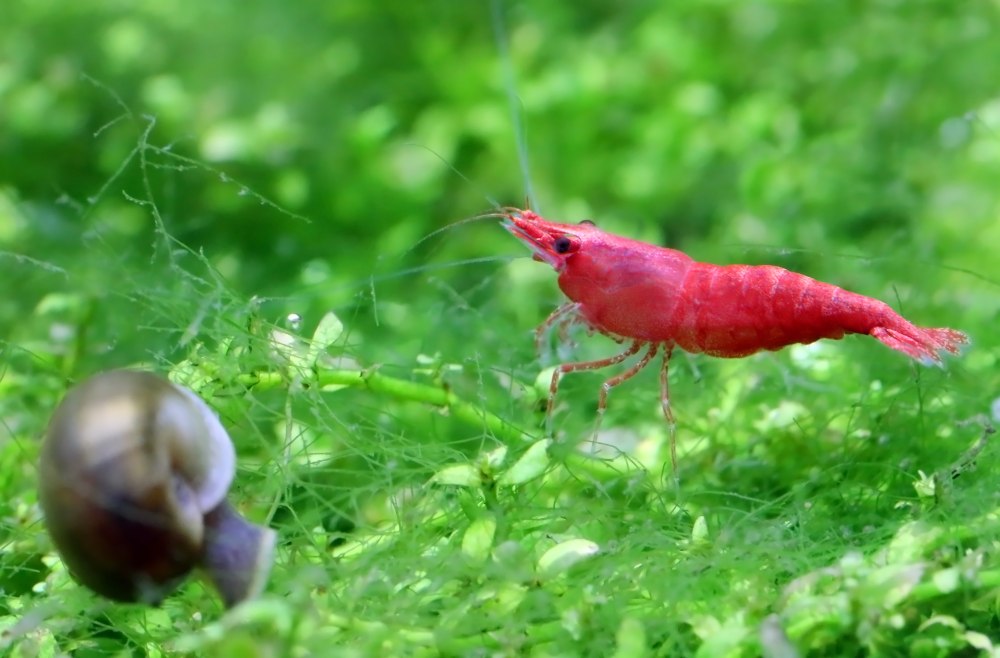
Bettas don’t have a good reputation when it comes to tank mates. Due to their aggressive nature, it’s difficult to keep them with other fish, and keeping two males in the same tank is a definite no-go, as they are too violent and will often fight to the death.
But regular betta fish can live with docile aquatic species like shrimp, guppies, and other bottom dwellers. So what about king bettas? Can king bettas live with other fish?
Generally speaking, no. King bettas tend to be more territorial than regular betta fish and should live in a tank without any other tank mates.
Where to find king betta fish
As I mentioned earlier, finding a king betta fish can be tricky. You’ll likely need to search through betta fish rescues and find breeders in your area.
However, don’t ignore your local pet store. Pet stores can get king betta fish in. This person on Reddit found a king betta at their local Petco.
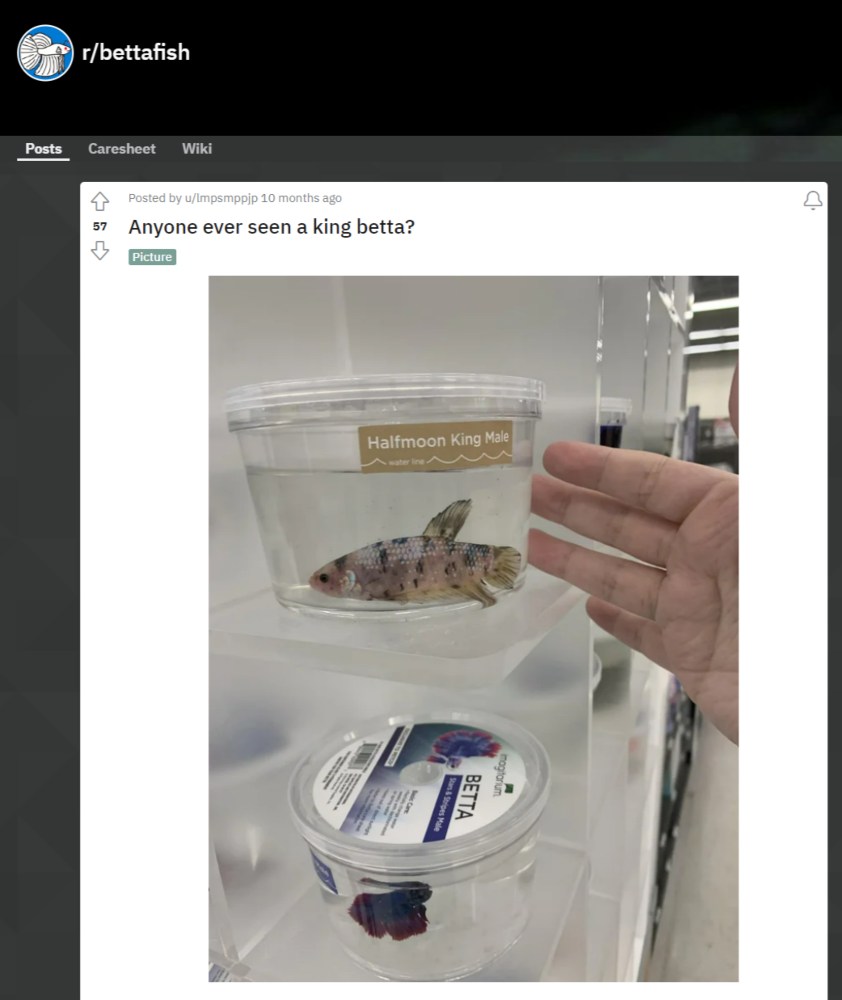
It’s worth calling your local pet stores and asking if they can put your name down on a list for a king betta. This way, if a king betta arrives, they can give you a call.
Breeding
If you manage to get your hands on two king bettas—a male and a female—you might be tempted to breed them.
Breeding is possible if you provide your fish with all the necessary conditions. You have to provide good quality food during the mating time, plus you have to transfer the pair to a breeding tank.
When the couple prepares for mating, the king betta male makes a bubble nest near the floating plants. Spawning takes place underneath the nest, where the male wraps around the female.
When the female first releases a few eggs, the male king betta carries them to the nest. When all the eggs are released, they are kept in the nest for hatching. At this moment, you should separate the female as the male will get violent towards the female fish.
The male betta will protect the eggs until they hatch, which should be within two to three days. The newly hatched fry will live inside the eggs for a couple of more days and will feed on the yolk sacs during this period.
Once the betta fry gets ready for swimming, you have to feed them with special food like Infusoria and free-living nematodes. Once they get a bit older, they can eat things like micro worms and Artemia nauplii.
Common diseases for king bettas
The risk of disease for king betta fish is the same as regular betta splendens. Without proper care, your king betta may get:
- Fin rot: when bacterial growth takes place in the betta tank, it will cause fin rot. Fin rot will make the short fins of the king betta look like tattered ribbons. If they don’t receive timely treatment, it can spread to bettas’ bodies and ultimately kill them.
- Constipation: constipation mainly happens due to overfeeding and shows symptoms like swollen body, loss of appetite, no feces at the tank bottom, and eyes popping out of their face.
- Fungal infection: any injury in the fish body will lead to fungal infection. The typical sign of fungal infection is white patches similar to cotton wool in the fish body.
- Ich: common signs of ich are white spots in the finnage, body, and gills. Affected fish will rub their body against the substrates and on the tank surface.
- Swim bladder disease: swim bladder disease results from bacterial infection, poor water parameters, stress, and injury. When affected, the fish will tilt on one side and float up to the top of the tank.
If you notice your king betta fish has any of the above diseases, please contact your local pet store or vet for help.
Conclusion
King bettas are a unique type of betta fish. It’s much bigger than a regular betta but smaller than a giant betta.
If you manage to come across this beautiful fish at your pet store, you won’t want to pass it up.
FAQs
No, betta Imbellis and king betta are not the same fish. The former is peaceful and one of the smallest varieties of betta. King bettas are betta Splendens, which are cousins to the betta Imbellis.
The average lifespan of king betta is two to three years if you take proper care.
Giant bettas can grow as big as six inches, while king bettas are usually four inches, and regular bettas are around three inches.

